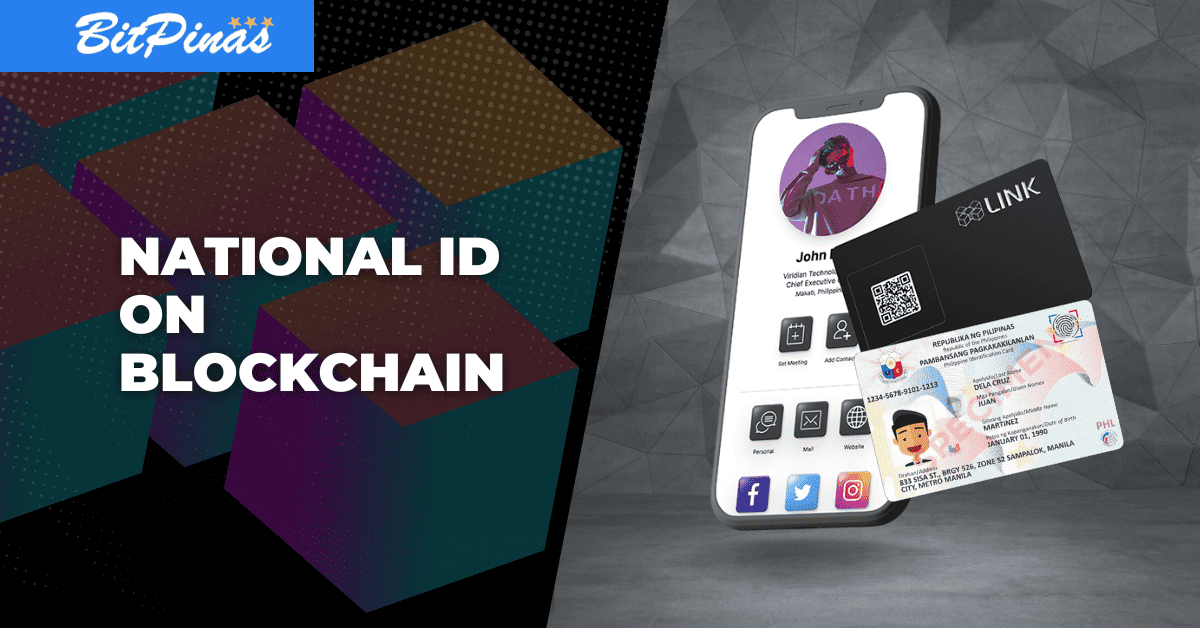Creating Tamper-Proof National IDs Using Blockchain Tech
Blockchain technology offers a secure and tamper-proof solution for storing personal data, particularly for national ID systems, which has raised concerns about privacy and surveillance.

Subscribe to our newsletter!
By Emman Navalan, CEO of Tetrix
- Blockchain technology offers a secure and tamper-proof solution for storing personal data, particularly for national ID systems, which has raised concerns about privacy and surveillance.
- Several countries, including Palau, Singapore, India, and South Korea, have already integrated blockchain technology into their ID systems, while some tech companies have proposed similar solutions to the Philippine government.
- Blockchain technology is more secure than traditional data storage systems, as it has multiple servers running simultaneously, making it less susceptible to hacks and other malicious activities.
For decades, citizens have endured the stress and waste of valuable time and resources just to line up at crowded government offices to get a copy of their IDs. Everyone has probably been asked for a valid ID a few times while applying for another valid ID. There were also instances where paper IDs, especially those without chips, were easily copied and forged. Furthermore, some local government offices lack databases to store data, making it more difficult for them to verify the IDs content and validity.

A Web3 enthusiast, advocating inclusion and innovation for a sustainable and trustless future, Emman Navalan leads Tetrix Network, an interconnected ecosystem that aims to bridge the gap among all blockchain projects.
He is also the founder and CEO of Viridian Technologies Inc., an IT solutions company offering top-of-the-line products and services primarily on Web3, aiming to provide an inclusive ecosystem that caters to the daily demands of its users. He was a former president and project manager in Aldaemuz Konstruct Inc., a PCAB registered company in the Philippines, handling innovative Industrial projects, as well as horizontal and residential construction.
The Need for Tamper-Proof IDs
Moreso, the current National ID program, or the Philippine Identification System (PhilSys), has also raised the eyebrows of various sectors due to accusations involving potential abuse of state surveillance. As of October 21, the Philippine Statistics Authority (PSA) reported that 22.5 million PVC cards have already been “dispatched,” a minuscule feat considering that a total of 74.2 million Filipinos registered for the PhilSys.
A lot of tech companies have tried and begun initial talks with the government to propose a more secure blockchain for storing data because of its tamper-proof and decentralized technology. To date, the government still uses traditional data storage, such as data banks and data clouds, to store the personal data of millions of national ID registrants.
Examples of Countries and Companies Using Blockchain for IDs
Blockchain technology has come a long way than we actually perceived, and other countries have already integrated it into their ID system. Early this year, Palau became the first country to offer a blockchain-based residency and ID system to provide its citizens access to future services within it emerging digital economy. Most recently, South Korea unveiled its plan to allow its citizens to use blockchain-based digital ID instead of physical cards as soon as 2024. South Koreans could soon use digital IDs embedded as an app within their mobile devices, working in a similar fashion to physical resident registration cards. Neighboring countries such as Singapore and India have already used blockchain for their respective departments.
Even big conglomerates, especially in banking and financial institutions, use blockchain to lessen the number of days and processing hours for both transactions locally and internationally. Wire transfers are now shorter than before. This alone should be an eye-opener for the government to adopt what the private sector is doing.
Blockchain Technology as a Solution for Secure ID Storage
Blockchain offers a more secure feature wherein data that’s stored on top of blockchain networks cannot be maliciously attacked and will not have a single point of failure. Shifting to blockchain for storage could help authorities track simple changes or transfers of data. But while it is hackproof, the security will depend on the architecture of the blockchain as it is not all made the same.
There are different forms of storage, but comparing it to a database cloud system or data bank getting hacked, blockchain is significantly more secure as it has multiple servers around the globe running and operating simultaneously instead of storing it in the offices.
The Potential of Blockchain for Other Types of IDs and Documents
The underlying technology of blockchain is more than just the NFTs and cryptocurrencies as it allows us to store our data now and control it even better than before. It could also be used not solely for an ID, but also for issuing Filipinos’ social security, documents being printed by PSA, transferring different types of IDs – from National ID to driver’s license, passport, etc.
In the Philippines, there exists an ID card technology called Tetrix Link Card powered by blockchain, which offers its users the ability to control which information they want to share and store. The network that stores all of the data employs blockchain technology, which eliminates the possibility of hacks and other malicious activities. This does not immediately resolve the physical card issue but makes each ID unique and valid.
While there is some development on the blockchain front, there is still a long road ahead of us. We need to take the learning deeper as we have better technology that could grow exponentially, especially in the coming years. In the world of advanced technology, education plays a big role in terms of adoption.
Blockchain technology could be the best solution, compared to the existing ones, to make the government ID system faster and even better.
This opinion article is contributed to BitPinas: Creating Tamper-Proof National IDs Using Blockchain Tech
Disclaimer: BitPinas articles and its external content are not financial advice. The team serves to deliver independent, unbiased news to provide information for Philippine-crypto and beyond.





